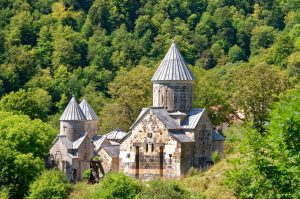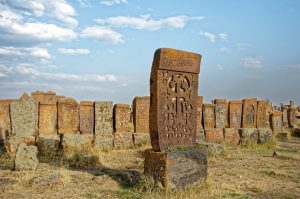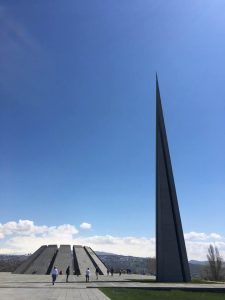100 Russian Domain: Historical Geography III –
The Armenian Genocide
“History has never been fair to the Armenians and it is too late to start being so now.”
– Colin McEvedy, British polymath scholar
This chapter was written by an expert on this particular topic – Professor Thomas Earl Porter.

Advances in technology and the development of virulent nationalism in the early 20th century made the wholesale slaughter of entire peoples possible. When we think of such horrific events most people think of the Nazis and the Holocaust; however, decades earlier Germans had already engaged in the extermination of the Herero people in southwest Africa. Also, a systematic and organized campaign of mass murder previously had been perpetrated by the Turks against their Armenian minority in 1915. Both of these acts of atrocious political violence occurred before the word “genocide” had even been invented by the Polish-Jewish legal scholar Raphael Lemkin. After the Nazis invaded the Soviet Union in 1941 and began the slaying of Jews, a mass killing that Winston Churchill called “a crime without a name,” Lemkin put the Greek word genos (race or people) with the Latin cide (the act of killing) to coin the neologism genocide, the killing of a people. He well understood the connections between what had happened in Turkey and what was happening in Europe. So did Adolf Hitler. In a speech in 1939, Hitler described his plans for a murderous campaign of expansion to the East. Hitler called for the removal or extermination of its inhabitants and said “who, after all, speaks of the annihilation of the Armenians today?” In many ways, the Armenian Genocide provided a template for Hitler and his evil plans.

Photo by Makalu from Pixabay.
The Muslim Turkish rulers of the Ottoman Empire carried out the deliberate and systematic genocide of the Christian Armenian people under cover of the First World War (1914-18). The “Young Turks” that had gained control of the government wanted to turn their backs on the multi-ethnic Ottoman Empire and create a secular Turkish national state. To do so, the nearly 3,000 year- old Armenian people, who had been a barely tolerated minority under the sultans, would have to be expelled forcibly from Asia Minor. The Armenians, despised by many Turks for their involvement in commerce and trade, had been subjected to periodic brutal state-sponsored massacres by their overlords for centuries. The last, in 1895-96, had resulted in the deaths of over 100,000 Armenians. These calculated depredations were designed to keep the Armenians subjugated and to forestall the development of a national consciousness among them. The outbreak of the First World War heightened Turkish suspicions as to the loyalty of their Armenian subjects, as half of the Armenian people were located across the border in the Russian Empire. Now that the Ottoman Empire was at war with Russia, the Turks feared that the Orthodox Christian Armenians would make common cause with their co-religionist Orthodox Russians and fellow Armenians across the border to seek their own national state.
Ottoman Turkey, like Nazi Germany, made a deliberate attempt to eliminate an entire ethno-religious community from its territory. Of course, the Jews in Germany were in fact Germans, whereas the Armenians were merely subjects of the Sublime Porte, the central Ottoman government. In the former case, however, all Jews everywhere were liable for extermination while in the latter, even though the Armenian community was to be wholly destroyed within the state’s borders, the main goal of the Committee of Union and Progress (CUP) was the “Turkification” of Anatolia. Both regimes’ policies were ideologically driven. The Nazi onslaught was consequence of the idea of a “racial struggle” for primacy and the CUP by an ethno-nationalist conception of a future Islamic and Turkish state. Both genocides were conducted under the cover of World Wars with railroads and forced marches used to move the unfortunate victims to their deaths. Additionally, it was the advent of modern states and their communication systems that made the coordination of the necessary logistics easier. It was no coincidence that Talaat Pasha, the motive force and mastermind of the Armenian Genocide as Minister of Interior Affairs, had previously worked in the telegraph and posts ministry. He had had a telegraph machine installed in his office and from there he personally oversaw the conduct of operations. Modern states need bureaucracies to carry out policies, including a policy of genocide, and in the Armenian Genocide the paper trail was minimal due to the orders being relayed by telegraph.

The Turks began their onslaught on April 24, 1915, with the arrest of prominent Armenians such as artists, writers, clergymen and political figures. Armenians who had been conscripted into the Turkish army were disarmed and herded together in hastily erected camps. Many of these people were summarily executed, those that were not would be dead anyway within a few weeks from forced labor. The orders then went out to empty all Armenian towns and villages. Some people were deported on trains and others by wagons, but most of the victims were forced to leave for the border on foot. Their homes were looted and ransacked as soon as they left them. The roads were clogged with thousands upon thousands of frightened Armenians. It was here that the real misery began. As these unfortunates were being driven into the Syrian desert to perish of thirst and exposure, they were attacked by soldiers of the “Special Organization.” Any goods or property with them were taken away by force. Women and girls were raped and then killed, others were taken to be forcibly converted to Islam and employed as servants or concubines. Civilians joined the onslaught as they stole, raped, and murdered with impunity. Local Kurdish tribespeople also took advantage of the situation to enrich themselves. Within a few months, over 1.5 million Armenians were dead. Other deaths would follow, as Ottoman forces pushed into Russian territory and encountered more Armenians there. Of the previous total population of four million, possibly up to half (two million) of the Armenian people perished, either as a result of being killed outright or through a lack of food and water. In the aftermath of the massacres, Armenian churches were destroyed and any physical remnants of their cultural heritage such as schools, monasteries, monuments, etc. were obliterated. All that remained was their language, their songs, and the collective memory of their Holocaust.

Photo by Stephen Bache.
A century later Armenians are finally receiving a small measure of justice. The Turks have denied that a genocide occurred, positing that the numbers were far fewer than now generally accepted, and that the Armenians actually were traitors during a time of war, colluding with Russia for Turkey’s destruction. For fear of upsetting Turkey as a crucial NATO ally, officially the United States hesitated to acknowledge the measures taken against the Armenians as a genocide, even through the administration of Barack Obama (who had actually promised the Armenian diaspora in California that he would do so if elected President). The Kurds, who also have long been seeking an independent state, recently apologized for their complicity in the heinous atrocities committed against the Armenian people. Ironically, it was the Turkish assault on these same Kurds, who had been American allies against ISIS until the United States precipitously withdrew their forces from the region, that galvanized the US Congress to vote finally in 2019 to call the Turkish actions by its name – Genocide.
On April 24, 2021, the 106thanniversary of the start of the massacres, President Joseph Biden fulfilled his campaign pledge to use the word genocide to describe the mass killings and deportations of Armenians by the Ottoman Turks. The President of Turkey, Recep Tayyip Erdogan, while offering his condolences “to Ottoman Armenians, who lost their lives during the difficult circumstances of World War I,” continues to assert that “only” 300,000 Armenians lost their lives and that the actions taken by the Turkish government did not amount to genocide.
Did You Know?
Cited and additional bibliography:
Bache, Stephen. 2019. Armenian Genocide Memorial.
Demushkin, Sergey. n.d. Armenia. Accessed November 4, 2020. https://thenounproject.com/search/?q=armenia&i=535258.
Makalu. 2018a. Haghartsin Monastery, Armenia. https://pixabay.com/photos/armenia-the-monastery-of-haghartsin-3718283/.
———. 2018b. Armenian Graveyard. https://pixabay.com/photos/armenia-the-cemetery-of-noratus-3721413/.

